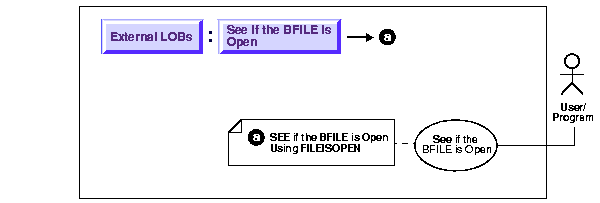Release 2 (8.1.6)
A76940-01
Library |
Product |
Contents |
Index |
| Oracle8i Application Developer's Guide - Large Objects (LOBs) Release 2 (8.1.6) A76940-01 |
|
External LOBs (BFILEs), 20 of 41

|
See Also:
"Use Case Model: External LOBs (BFILEs)" for all basic operations of External LOBs (BFILES). |
This procedure describes how to see if a BFILE is OPEN with FILEISOPEN.
While you can continue to use the older FILEISOPEN form, we strongly recommend that you switch to using ISOPEN, because this facilitates future extensibility.
See Chapter 3, "LOB Programmatic Environments" for a list of available functions in each programmatic environment. Use the following syntax references for each programmatic environment:
These examples query whether a BFILE associated with Music is open. Examples are provided in the following four programmatic environments:
/* Note that the example procedure seeIfOpenBFILE_procOne is not part of the DBMS_LOB package: */ CREATE OR REPLACE PROCEDURE seeIfOpenBFILE_procOne IS Lob_loc BFILE; RetVal INTEGER; BEGIN /* Select the LOB, initializing the BFILE locator: */ SELECT Music INTO Lob_loc FROM Multimedia_tab WHERE Clip_ID = 3; RetVal := DBMS_LOB.FILEISOPEN(Lob_loc); IF (RetVal = 1) THEN DBMS_OUTPUT.PUT_LINE('File is open'); ELSE DBMS_OUTPUT.PUT_LINE('File is not open'); END IF; EXCEPTION WHEN OTHERS THEN DBMS_OUTPUT.PUT_LINE('Operation failed'); END;
/* Select the lob/bfile from the Multimedia table */ void selectLob(Lob_loc, errhp, svchp, stmthp) OCILobLocator *Lob_loc; OCIError *errhp; OCISvcCtx *svchp; OCIStmt *stmthp; { OCIDefine *dfnhp; text *selstmt = (text *) "SELECT Music FROM Multimedia_tab WHERE Clip_ID=3"; /* Prepare the SQL select statement */ checkerr (errhp, OCIStmtPrepare(stmthp, errhp, selstmt, (ub4) strlen((char *) selstmt), (ub4) OCI_NTV_SYNTAX, (ub4)OCI_DEFAULT)); /* Call define for the bfile column */ checkerr (errhp, OCIDefineByPos(stmthp, &dfnhp, errhp, 1, (dvoid *)&Lob_loc, 0 , SQLT_BFILE, (dvoid *)0, (ub2 *)0, (ub2 *)0, OCI_DEFAULT)); /* Execute the SQL select statement */ checkerr (errhp, OCIStmtExecute(svchp, stmthp, errhp, (ub4) 1, (ub4) 0, (CONST OCISnapshot*) 0, (OCISnapshot*) 0, (ub4) OCI_DEFAULT)); } void BfileFileIsOpen(envhp, errhp, svchp, stmthp) OCIEnv *envhp; OCIError *errhp; OCISvcCtx *svchp; OCIStmt *stmthp; { OCILobLocator *bfile_loc; boolean flag; /* Allocate the locator descriptor */ (void) OCIDescriptorAlloc((dvoid *) envhp, (dvoid **) &bfile_loc, (ub4) OCI_DTYPE_FILE, (size_t) 0, (dvoid **) 0); /* Select the bfile */ selectLob(bfile_loc, errhp, svchp, stmthp); checkerr(errhp, OCILobFileOpen(svchp, errhp, bfile_loc, (ub1)OCI_FILE_READONLY)); checkerr(errhp, OCILobFileIsOpen(svchp, errhp, bfile_loc, &flag)); if (flag == TRUE) { printf("File is open\n"); } else { printf("File is not open\n"); } checkerr(errhp, OCILobFileClose(svchp, errhp, bfile_loc)); /* Free the locator descriptor */ OCIDescriptorFree((dvoid *)bfile_loc, (ub4)OCI_DTYPE_FILE); }
|
Note: At the present time, OO4O only offers ISOPEN to test whether or not a BFILE is open (see "Visual Basic (OO4O): See If the BFILE is Open with FILEISOPEN"). |
import java.io.InputStream; import java.io.OutputStream; // Core JDBC classes: import java.sql.DriverManager; import java.sql.Connection; import java.sql.Statement; import java.sql.PreparedStatement; import java.sql.ResultSet; import java.sql.SQLException; // Oracle Specific JDBC classes: import oracle.sql.*; import oracle.jdbc.driver.*; public class Ex4_41 { public static void main (String args []) throws Exception { // Load the Oracle JDBC driver: DriverManager.registerDriver(new oracle.jdbc.driver.OracleDriver()); // Connect to the database: Connection conn = DriverManager.getConnection ("jdbc:oracle:oci8:@", "samp", "samp"); conn.setAutoCommit (false); // Create a Statement: Statement stmt = conn.createStatement (); try { BFILE src_lob = null; ResultSet rset = null; rset = stmt.executeQuery ( "SELECT BFILENAME('PHOTO_DIR', 'Lincoln_photo') FROM DUAL"); if (rset.next()) { src_lob = ((OracleResultSet)rset).getBFILE (1); OracleCallableStatement cstmt = (OracleCallableStatement) conn.prepareCall ("begin dbms_lob.open (?,dbms_lob.lob_readonly); end;"); cstmt.registerOutParameter(1,OracleTypes.BFILE); cstmt.setBFILE (1, src_lob); cstmt.execute(); src_lob = cstmt.getBFILE(1); System.out.println ("the file is now open"); } // Close the BFILE, statement and connection: src_lob.closeFile(); stmt.close(); conn.commit(); conn.close(); } catch (SQLException e) { e.printStackTrace(); } } }
|
|
 Copyright © 1999 Oracle Corporation. All Rights Reserved. |
|